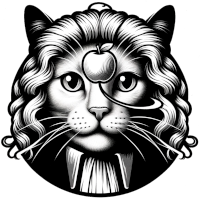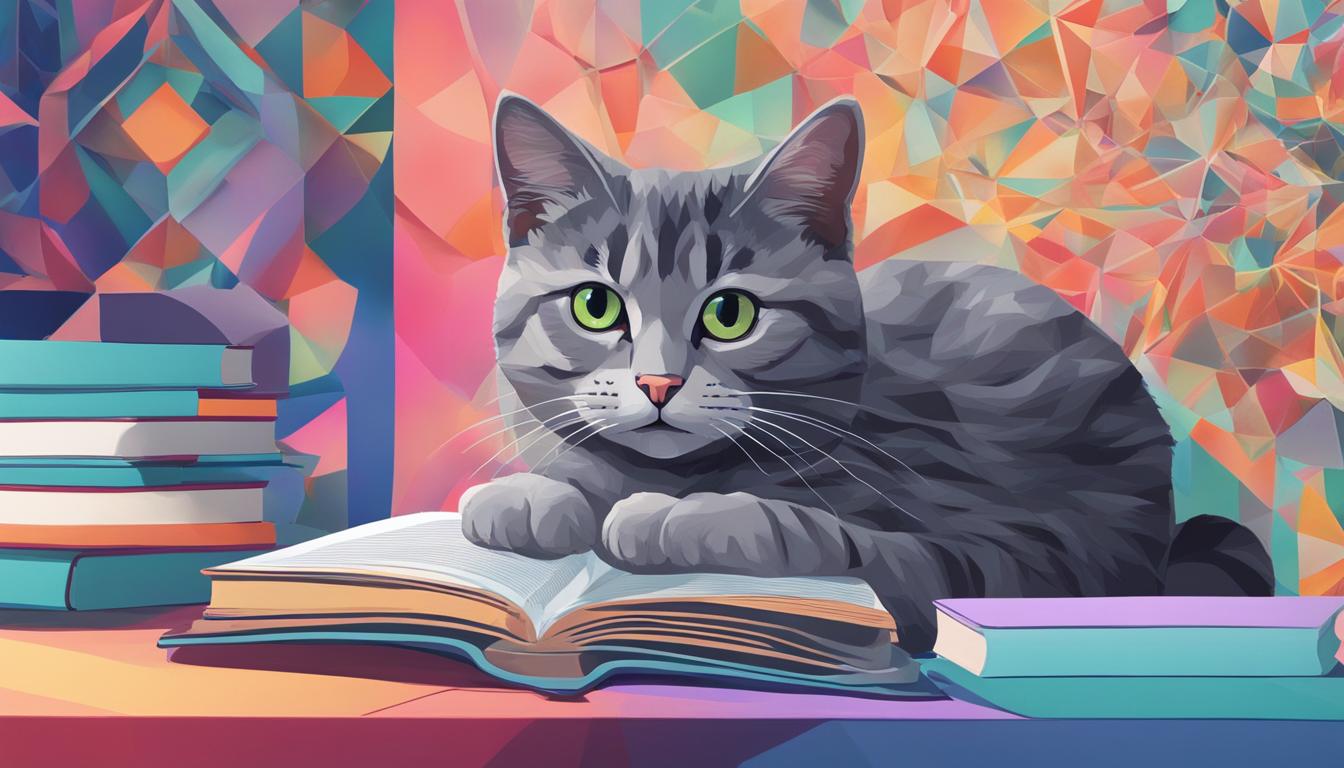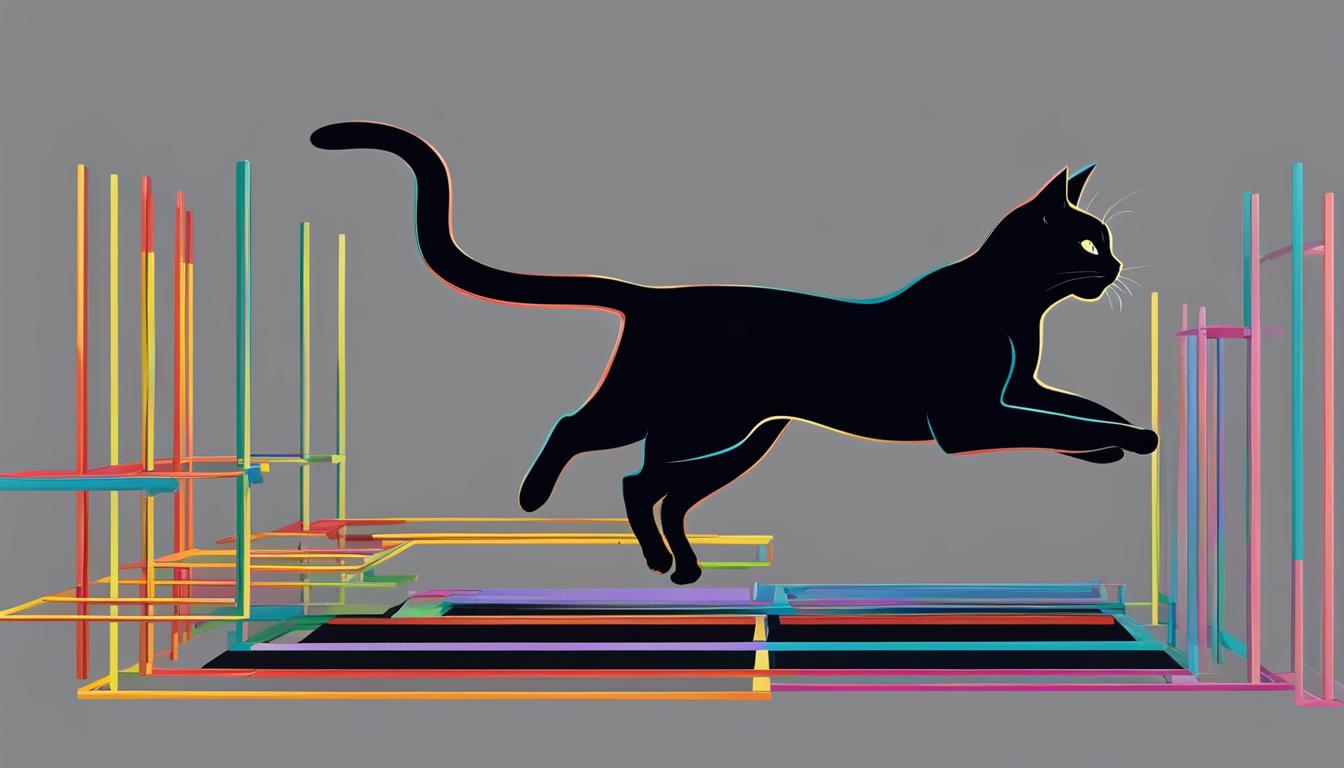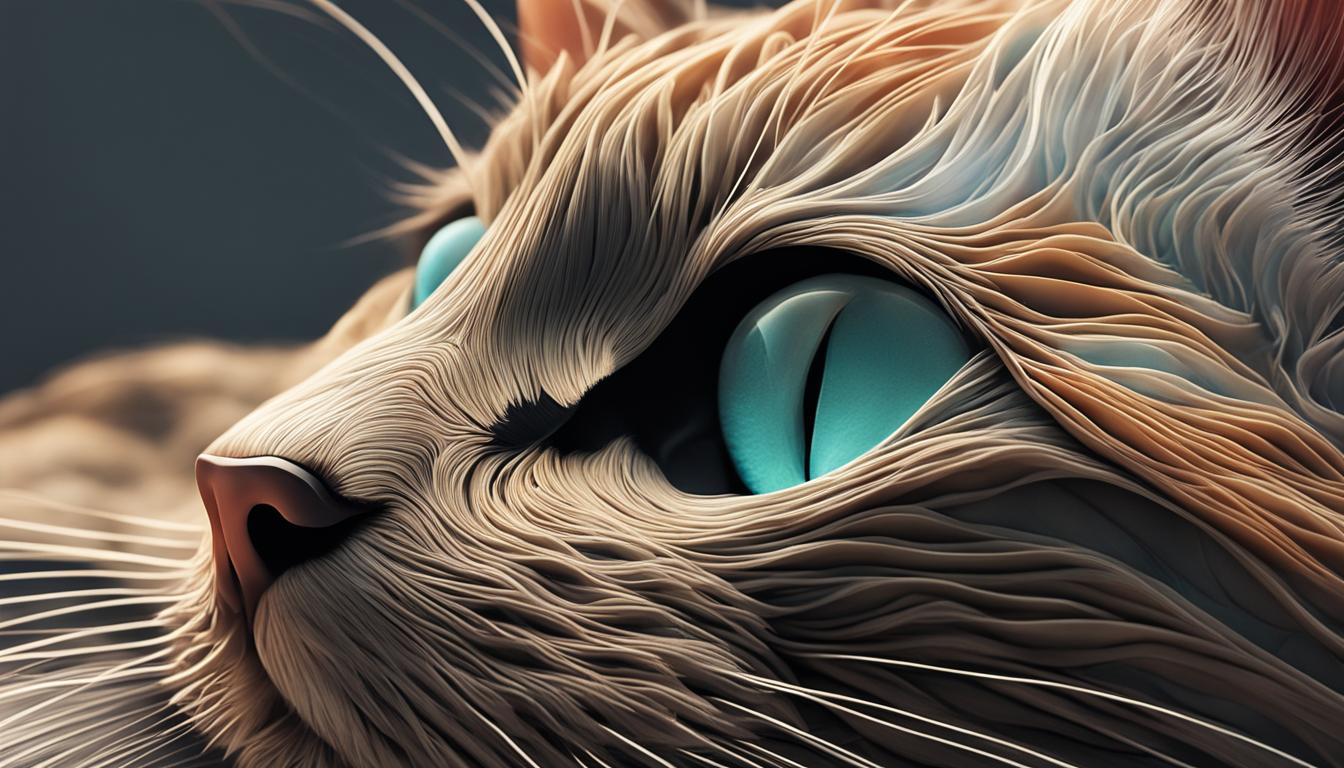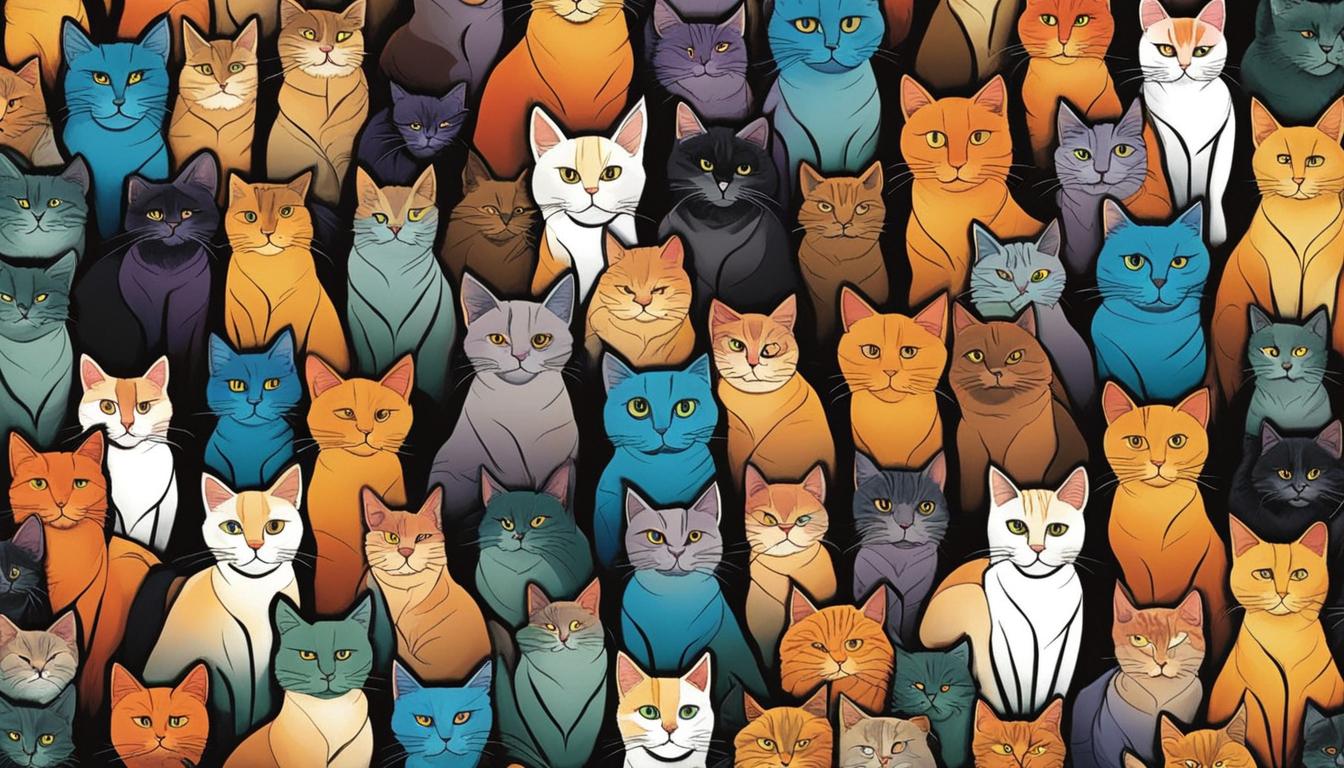As a cat owner, I’ve always been fascinated by the mysterious and independent nature of our feline friends. But as our beloved cats age, just like us, they can experience cognitive decline and brain aging. That’s why understanding feline cognitive health and taking proactive measures to prevent it is crucial.
Did you know that the number of cats living in U.S. homes has been on the rise? Thanks to improved care and increased lifespan, more of our feline companions are enjoying long and fulfilling lives. However, with age comes the increased risk of cognitive dysfunction, which is comparable to Alzheimer’s disease in humans.
Recognizing the signs of cognitive decline in cats is essential for early intervention. Symptoms such as disorientation, altered sleep patterns, loss of interest in activities, and changes in litter box behavior may indicate a decline in brain health. But fret not, there are steps we can take to support our cats’ cognitive well-being!
Key Takeaways:
- Feline cognitive health is a critical aspect of overall well-being for aging cats.
- Signs of cognitive dysfunction in cats include disorientation, altered sleep patterns, and changes in behavior.
- Nutrition plays a vital role in promoting feline cognitive health, with antioxidants and omega-3 fatty acids being particularly beneficial.
- Environmental enrichment through engaging activities and a cat-friendly environment can help maintain cognitive function.
- Regular veterinary check-ups and early intervention with appropriate treatments can improve the quality of life for cats experiencing cognitive decline.
Understanding Feline Cognitive Dysfunction
Feline cognitive dysfunction, also known as cat dementia, is a condition that affects older cats and shares similarities with Alzheimer’s disease in humans. It’s essential for cat owners to recognize the signs of cognitive decline in their furry companions and take appropriate measures to manage the condition effectively.
One of the key signs of cognitive dysfunction in cats is spatial disorientation. You may notice your cat getting lost in familiar surroundings or struggling to find its way home. Excessive sleeping or altered sleep patterns can also indicate cognitive decline. If your once playful and active cat starts showing a lack of interest in toys and activities, it may be a sign of cat dementia. Additionally, changes in litter box behavior, such as urinating outside the box, can be an indication of cognitive dysfunction in older cats.
It’s important to note that these signs may also be caused by other underlying medical conditions or the natural aging process itself. Therefore, it’s crucial to consult with a veterinarian to rule out other potential causes before concluding that your cat is experiencing cognitive dysfunction. Your vet will be able to assess your cat’s overall health and behavior and provide a proper diagnosis.
Quote:
“Recognizing the signs of cognitive decline in cats is the first step towards managing the condition effectively. By closely observing their behavior and seeking veterinary guidance, cat owners can provide the necessary support and care to improve their feline companion’s quality of life.” – Dr. Jane Peterson, Veterinary Neurologist
Managing dementia in older cats involves a multi-faceted approach. Environmental enrichment is an important aspect of cognitive maintenance. Providing stimulating activities and creating a cat-friendly environment can help keep your cat’s brain active. Puzzle toys, interactive play sessions, and scent enrichment can all contribute to cognitive stimulation.
In addition to environmental enrichment, a balanced and nutritious diet plays a crucial role in feline cognitive health. Nutritional support with brain health supplements, such as those rich in antioxidants and omega-3 fatty acids, can help delay the effects of aging on the brain. These supplements provide essential nutrients that support brain function and protect against oxidative stress.
By understanding the signs of cognitive decline in cats and implementing appropriate management strategies, cat owners can help their aging feline friends maintain optimal brain health and improve their overall well-being.
| Signs of Cognitive Dysfunction in Cats: | Management Strategies: |
|---|---|
| 1. Spatial disorientation | 1. Provide a consistent and familiar environment |
| 2. Excessive sleeping or altered sleep patterns | 2. Engage your cat in regular interactive play sessions |
| 3. Lack of interest in playing and toys | 3. Use puzzle toys to stimulate cognitive function |
| 4. Changes in litter box behavior | 4. Ensure easy and accessible litter box locations |
Diagnosing and Treating Feline Cognitive Dysfunction
Diagnosing cognitive dysfunction in aging cats can be challenging, as the signs and symptoms may overlap with other medical conditions. It is important for cat owners to closely monitor their pet’s behavior and seek veterinary guidance when changes occur. Common behavior changes to watch for include disorientation, increased vocalization, decreased appetite, and decreased interest in grooming.
Veterinarians will typically start the diagnostic process by ruling out any underlying medical conditions that may be causing or contributing to the behavioral changes. This may involve blood tests, imaging tests, and comprehensive physical exams. If medical conditions are ruled out and cognitive dysfunction is suspected, further evaluation may be necessary.
| Treatment Options for Feline Cognitive Dysfunction | Benefits |
|---|---|
| Anti-anxiety medication | Reduces anxiety and stress, improving overall quality of life |
| Brain health supplements | Supports brain function, provides essential nutrients, and delays cognitive decline |
| Environmental enrichment | Stimulates the brain and promotes cognitive maintenance |
| Behavior modification techniques | Helps manage and minimize problem behaviors associated with cognitive dysfunction |
Once a diagnosis of cognitive dysfunction is confirmed, treatment options can be explored. Anti-anxiety medication may be prescribed to alleviate anxiety and stress, improving the overall quality of life for cats with cognitive dysfunction. Additionally, brain health supplements can provide essential nutrients to support brain function and delay the progression of cognitive decline.
Environmental enrichment is another important aspect of managing feline cognitive dysfunction. Providing a stimulating and engaging environment, with interactive toys, scratching posts, and climbing structures, can help keep the aging cat’s brain active and prevent cognitive decline. Consistency in routine and creating a calm and stress-free environment can also benefit cats with cognitive dysfunction.
The Role of Nutrition in Feline Cognitive Health
Nutrition plays a crucial role in promoting feline cognitive health. Just like our brains, a cat’s brain requires specific nutrients to function optimally and prevent age-related cognitive decline. By providing a balanced and nutritious diet, we can support their brain health and help prevent brain aging in felines.
One essential nutrient for cat brain health is vitamin E. This powerful antioxidant helps protect brain cells from oxidative stress and may help delay cognitive decline. Including vitamin E-rich foods, such as sunflower seeds, almonds, and spinach, in your cat’s diet can be beneficial.
Another key nutrient for feline cognitive health is omega-3 fatty acids. These healthy fats have been shown to have anti-inflammatory properties and may support brain function. Fish oil is a great source of omega-3 fatty acids, and adding it to your cat’s diet can help promote brain health.
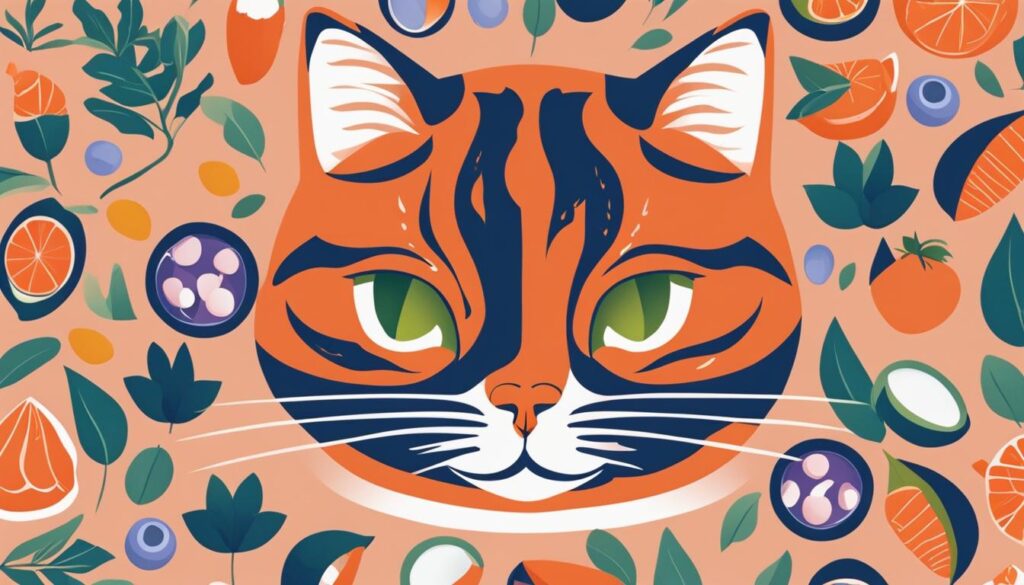
Brain Aging Prevention in Felines
When it comes to brain aging prevention in felines, certain substances have shown promising results. Medium-chain triglycerides (MCTs) and ketones, for example, provide alternative energy sources for the aging brain and support cognitive function. These can be found in specific diets or as supplements designed to support brain health.
Supplementing your cat’s diet with B vitamins can also be beneficial. B vitamins, such as thiamine, riboflavin, and niacin, play a crucial role in energy production and brain function. Including foods rich in B vitamins, like poultry, fish, and eggs, can help provide the necessary nutritional support for your cat’s brain health.
| Nutrient | Food Sources |
|---|---|
| Vitamin E | Spinach, sunflower seeds, almonds |
| Omega-3 Fatty Acids | Fish oil, fatty fish |
| MCTs and Ketones | Specific diets or supplements |
| B Vitamins | Poultry, fish, eggs |
Incorporating these nutrients into your cat’s diet, either through natural food sources or supplements, can help support their brain health and potentially delay the onset of cognitive decline. Always consult with your veterinarian for specific nutritional recommendations tailored to your cat’s individual needs.
Environmental Enrichment for Cognitive Maintenance
As cat owners, we want our furry friends to stay mentally sharp and agile as they age. One way to support their cognitive health is through environmental enrichment. By providing stimulating activities and a cat-friendly environment, we can help our feline companions maintain their cognitive function for longer.
Engaging Cognitive Stimulation Activities
Cats are curious creatures, and they thrive when given opportunities to explore and engage with their surroundings. Incorporating cognitive stimulation activities into their daily routine can help keep their brains active and prevent cognitive decline. Interactive puzzle toys, such as treat puzzles or food-dispensing toys, can challenge their problem-solving skills and keep them mentally stimulated.
Scent enrichment is another effective way to engage a cat’s cognitive abilities. You can hide small amounts of food or treats around the house, encouraging them to use their sense of smell to locate the hidden treasures. This not only provides mental stimulation but also taps into their natural hunting instincts.
A Cat-Friendly Environment
In addition to engaging activities, creating a cat-friendly environment is crucial for cognitive maintenance. Easy access to litter boxes and food bowls can reduce stress and ensure that they can fulfill their basic needs without difficulty. Installing ramps or steps can aid senior cats with mobility challenges, allowing them to navigate their environment with ease.
Establishing consistent routines and providing a predictable environment can also contribute to cognitive well-being. Cats thrive on routine, and a stable and predictable daily schedule can help reduce anxiety and maintain cognitive function.
| Activity | Benefits |
|---|---|
| Interactive Play | Keeps the brain active and improves coordination |
| Puzzle Toys | Gives cats a mental workout and stimulates problem-solving skills |
| Scent Enrichment | Engages their sense of smell and taps into their hunting instincts |
| Consistent Routines | Reduces anxiety and provides a sense of security |
By incorporating cognitive stimulation activities and creating a cat-friendly environment, we can promote cognitive maintenance and support our cats’ brain health as they age. Remember, a happy and mentally stimulated cat leads to a healthier and more agile feline brain.
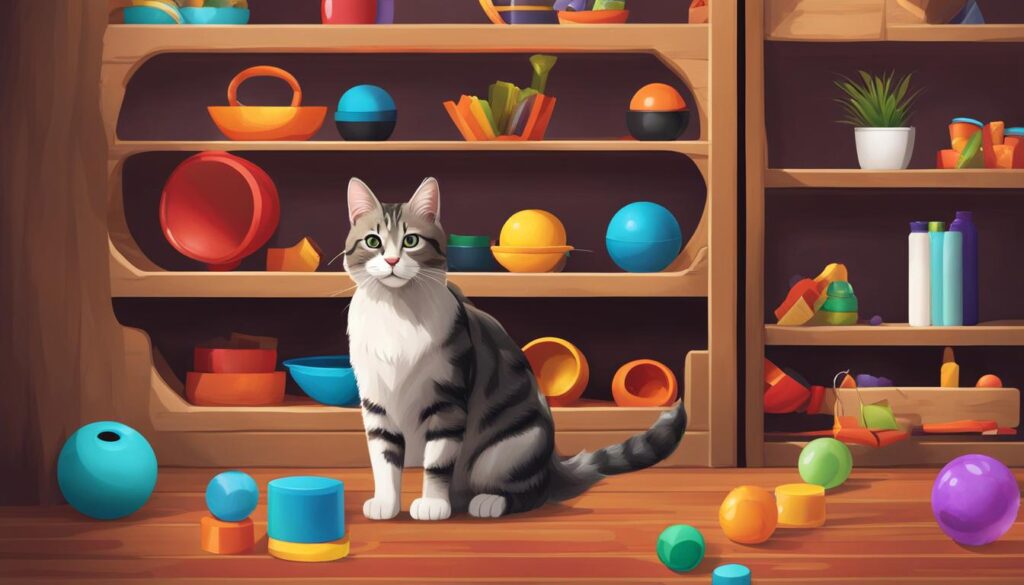
Conclusion
As a cat lover, I’m always looking for ways to ensure the well-being of my furry friends, and feline cognitive health is no exception. By understanding the signs of cognitive decline and taking proactive measures, we can help our aging cats maintain optimal brain function for as long as possible.
One key aspect of promoting feline cognitive health is providing brain health supplements specifically formulated for felines. These supplements, enriched with essential nutrients and antioxidants, can support cognitive function and delay the onset of cognitive dysfunction. So, if you want your cat to stay sharp and attentive, consider incorporating these supplements into their daily routine.
Managing dementia in older cats requires a multi-faceted approach. It’s crucial to create a cat-friendly environment that encourages mental stimulation. Engage your cat in cognitive stimulation activities like puzzle toys and interactive play to keep their brain active and agile. Additionally, regular veterinary check-ups and early intervention with appropriate treatments can significantly improve your cat’s quality of life while experiencing cognitive decline.
Remember, our feline friends age gracefully when we prioritize their cognitive health. So, let’s provide them with a balanced and nutritious diet, engage them in stimulating activities, and ensure they have a safe and enriching environment. By doing so, we can help them maintain their cognitive abilities and enjoy a happy and healthy life.
FAQ
What are the signs of cognitive dysfunction in cats?
Signs of cognitive dysfunction in cats include disorientation, altered sleep patterns, loss of interest in activities, and changes in litter box behavior.
At what age do cats typically start showing signs of cognitive dysfunction?
Cognitive dysfunction in cats typically becomes noticeable when they reach 10 years of age or older.
What can cause behavioral changes in cats that resemble cognitive dysfunction?
Behavioral changes in cats can be caused by physical conditions, neurologic disorders, or the natural aging process. It is important to rule out other potential medical conditions before diagnosing cognitive dysfunction.
Is there a cure for cognitive dysfunction in cats?
There is no cure for cognitive dysfunction in cats, but early intervention and management strategies can help slow the progression of the condition and improve quality of life.
How can nutrition support feline cognitive health?
A diet rich in vitamin E, antioxidants, omega-3 fatty acids, and supplements like fish oil and B vitamins can help delay the effects of aging on the brain and protect against oxidative stress.
What role does environmental enrichment play in maintaining cognitive function in cats?
Environmental enrichment, such as cognitive stimulation activities, interactive play, and creating a cat-friendly environment, can help keep the brain active and prevent cognitive decline.
Source Links
- https://www.vet.cornell.edu/departments-centers-and-institutes/cornell-feline-health-center/health-information/feline-health-topics/cognitive-dysfunction
- https://www.purinainstitute.com/science-of-nutrition/advancing-brain-health/aging-brain
- https://vcahospitals.com/know-your-pet/nutrition-for-cats-with-cognitive-dysfunction-syndrome-cds
